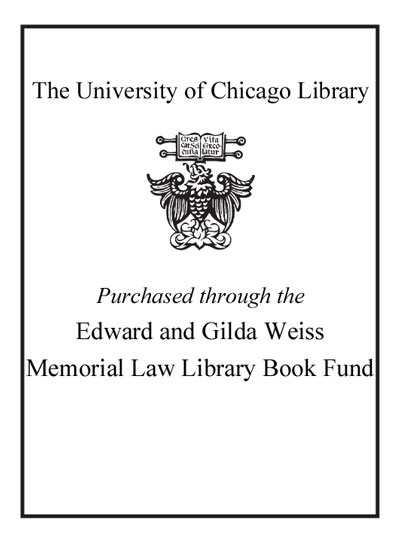As if peoples mattered ... : critical appraisal of 'peoples' and 'minorities' from the international human rights perspective and beyond /
Saved in:
| Author / Creator: | Skurbaty, Zelim. |
|---|---|
| Imprint: | The Hague ; Boston : M. Nijhoff Publishers, c2000. |
| Description: | xxvii, 498 p. : ill. ; 25 cm. |
| Language: | English |
| Series: | The Raoul Wallenberg Institute human rights library ; v. 4 Raoul Wallenberg Institute human rights library ; 4. |
| Subject: | |
| Format: | Print Book |
| URL for this record: | http://pi.lib.uchicago.edu/1001/cat/bib/4307297 |
Table of Contents:
- 1. Introductory Reflections or Invitation to 'Legitimate Suffering'. 1.1. Elegantia Juris (?) or the Commentary to a Commentary. 1.2. The Establishment of Observational Standpoints and Methodological Assumptions. 1.3. Key Taxonomic Dimensions of the 'Peoples' and 'Minorities': Quasi-Legal Knowledge, Tacit Knowledge and the Universal Group Code (UGC). 1.4. Structural Composition of the Work. 1.5. The Aim of the Exercise: Planting the Seed or the Law of the Farm
- 2. Corpus Juris: The Crystallization of Concepts and Codification of Standards Relevant to the International 'Minority Rights'. 2.1. Significatio. 2.2. Half Empty or Half Full? When 'Minorities' are 'Majorities' and Vice Versa. 2.3. The Political Framework of a 'Minority' Problematique: the Internal Conflicts Reign Supreme. 2.4. Formulation of 'Minority'-Specific Normative Standards and Problems for Inquiry. 2.5. The Standard Setting and 'Minority' Protection Within the Frameworks of the OSCE and Council of Europe: From the Garrison States of Europe to the European Community of Peoples. 2.6. 'Minorities' and The OSCE: From 'Seeing is Believing' to 'Believing is Seeing'
- 3. Test Case for International Human and 'Minority Rights': Chechnya, World Order and the 'Right to be Left Alone'. 3.1. 'Separation Anxiety': E Pluribus Plures. 3.2. The 'Case' in a Nutshell. 3.3. Constitutional Claims and Disclaimers. 3.4. 'The Right to Genocide': a Disguised Barter of Atrocities. 3.5. A Case in International Law: Strategic Assumptions
- 4. The Twilight of State Sovereignty: 'Great Expectations'. 4.1. The Way We Look at the Problem is the Problem. 4.2. The Old 'New Leviathan'. 4.3. States, U-Turns and Changes of Heart. 4.4. Sovereign(Reali)ty. 4.5. Sovereignty: Recapitulation and Tentative Conclusions
- 5. 'Peoples' and Self-Determination: Erasing the Mark with a Skull and Cross-Bones. 5.1. Is Self-Determination a 'Disease' or a 'Dis'-'Ease'. 5.2. Policies and Legalities: Double Entendre. 5.3. Clinical Case Study No. 2: Aland Islands. 5.4. Post-World War II Trends: Can the Dispossessed Dispose of Themselves? 5.5. Expanding Order of Meanings: Freeing from Solitary Confinement within 'Colonialism'. 5.6. Mutatis Mutandis or the Case Variables of Self-Determination. 5.7. Tentative Conclusions: Foresight, Hindsight and the Right to Secession
- 6. Coming to Grips with a 'Legitimate Minority': Backward in Coming Forward. 6.1. Philosophical Prolegomenon: Adventures of the 'Self' in 'Passing Over' and 'Coming Back'. 6.2. Ethnicity & 'Collectivity' vs. the One-Culture-Fits-All Thrust of Globalism: Hell hath no Fury like a Nation-in-the-Individual Scorned. 6.3. Article 27 of the Covenant on Civil and Political Rights: Janus Ex (Legal) Machina. 6.4. Clinical Case Study No. 7: Communication No. 167/1984, Bernard Ominayak, Chief of the Lubicon Lake Band v. Canada. 6.5. How It All Began: The League of Nations as an 'Experimentum Crucis' for Minorities. 6.6. Clinical Case Study No. 8. Polish Minority Treaty and the 'Acquisition of Polish Nationality' Case: 'Avant la Lettre' vs. 'Apres la Lettre' of Sovereignty. 6.7. Reflection and Assessment
- 7. 'Games Played with Peoples': Trading off the Insecurity of Future Gains Against the 'Security' of Present Pains. 7.1. Why 'Games'? 7.2. New Vantage Ground for 'Games': Transactional analysis model. 7.3. Analysis of Minority and Peoples Specific Provisions qua Games. 7.4. The Legal Game Format. 7.5. Typical Legal Game Matrix: 'Augurs' Smile'. 7.6. Analysis of Legal Texts qua Games: Suum cuique. 7.7. Game Points: 'Sleeping with an Enemy', Fighting with an Enemy or Ceasing to Play The Role of an 'Enemy' in a Game? 7.8. Author's Slant on the Problem: Summary
- 8. Beyond Games: From 'Sovereignty' to Equality, from 'Nation States' to 'Fully Functioning Groups' Via Individuation. 8.1. Exemplum ... 8.2. Hybrid Interregnum or the Last Gasp of the 'Sovereign' Past. 8.3. The Round-Up of the Critique: System-Maintaining Perspective as a 'Demonic Paradox'. 8.4. 'Progressive Development' or the 'Minority'-Related Standards. 8.5. Towards a New Normative Framework: Sponte Sua, Sine Lege. 8.6. The Revolutionary Premise: International Law as a (Global) Normative Servo-Mechanism and Jurisprudence as a Science of Normo-Cybernetics. 8.7. In Search of Ideal Normativeness. 8.8. The Need for a New Age Axiological Ethics: the New Holy Trinity of Self-Actualisation, Identity and Interdependence. 8.9. Conclusions: Practical Significance of Theory.

